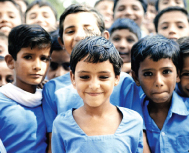Unbridled Courage: Indian Kids to Speak at UN

Come September 17, 2014, a group of 11 children will begin their 10 day journey to the United Nations to speak about inclusive education for both disabled and abled children. Spearheaded by a child advocacy group 'Nine is Mine', these children are hopeful that their demands will be included in the agenda of the Millennium Development Goals of 2015.
The much spoken about duo, Phynjoplang, born with speech and hearing impairment and Rida Khrim, his interpreter, will pilot the group for an exciting journey to New York where they will put forward their demands on behalf of millions of Indian children for proper healthcare, safe drinking water, well-equipped schools and protection from abuse and neglect.
Though only two members of the group understand English, they are all determined to make their voices heard from an international platform. Harita Kumari from Tamil Nadu can only speak in her native language, while Nayan Sarki from Kalimpong, West Bengal, can only talk in Nepali. But both know what they have to say in front of the world audience. While Harita wants equal rights for the girl child, Nayan is keen that India eradicates hunger.
Anees from Shillong in Meghalaya wants India to end child labor, especially for those working in the mines in Jaintia hills in the northeast. Similarly, for Surbhi and Risabh from Delhi, their demands are for equality and an adequate platform for the many deprived children. All these children have a unified claim for a better life, a life that gives them equal opportunity and privileges.
The much spoken about duo, Phynjoplang, born with speech and hearing impairment and Rida Khrim, his interpreter, will pilot the group for an exciting journey to New York where they will put forward their demands on behalf of millions of Indian children for proper healthcare, safe drinking water, well-equipped schools and protection from abuse and neglect.
Though only two members of the group understand English, they are all determined to make their voices heard from an international platform. Harita Kumari from Tamil Nadu can only speak in her native language, while Nayan Sarki from Kalimpong, West Bengal, can only talk in Nepali. But both know what they have to say in front of the world audience. While Harita wants equal rights for the girl child, Nayan is keen that India eradicates hunger.
Anees from Shillong in Meghalaya wants India to end child labor, especially for those working in the mines in Jaintia hills in the northeast. Similarly, for Surbhi and Risabh from Delhi, their demands are for equality and an adequate platform for the many deprived children. All these children have a unified claim for a better life, a life that gives them equal opportunity and privileges.

